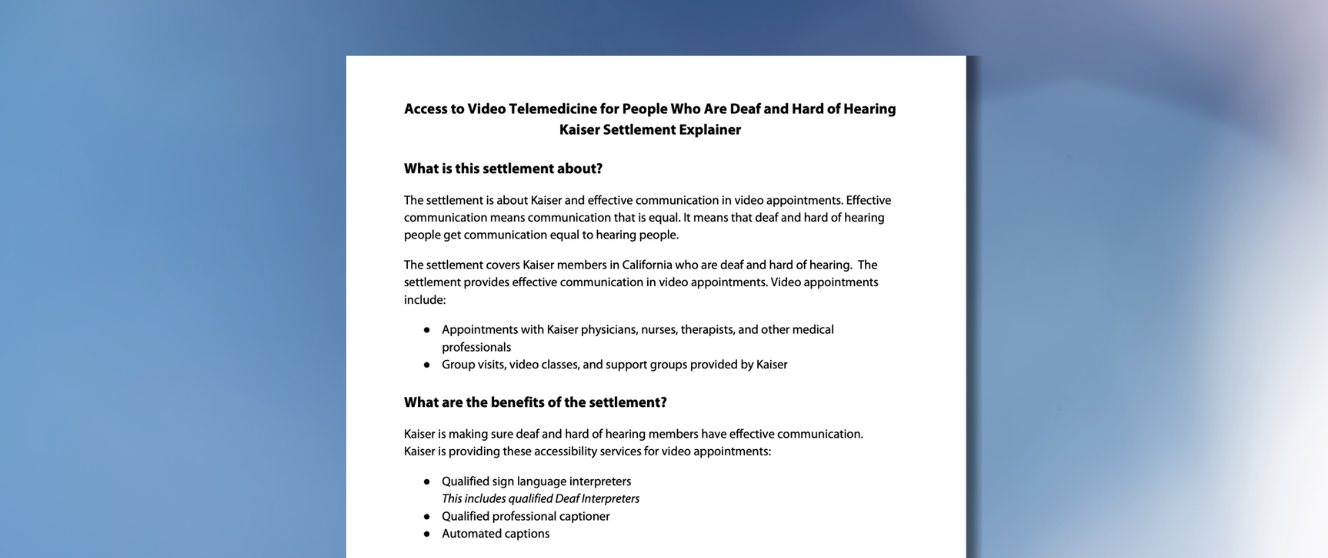Download the explainer as a Word (.doc) document
Download the explainer as a PDF
What is this settlement about?
The settlement is about Kaiser and effective communication in video appointments. Effective communication means communication that is equal. It means that deaf and hard of hearing people get communication equal to hearing people.
The settlement covers Kaiser members in California who are deaf and hard of hearing. The settlement provides effective communication in video appointments. Video appointments include:
- Appointments with Kaiser physicians, nurses, therapists, and other medical professionals
- Group visits, video classes, and support groups provided by Kaiser
What are the benefits of the settlement?
Kaiser is making sure deaf and hard of hearing members have effective communication. Kaiser is providing these accessibility services for video appointments:
- Qualified sign language interpreters
- This includes qualified Deaf Interpreters
- Qualified professional captioner
- Automated captions
Kaiser will do its best to find interpreters for members who use a sign language other than ASL. For example, Mexican Sign Language or Lengua de Señas Mexicana (LSM).
How does it work?
Deaf and hard of hearing Kaiser members can say what they need for video appointments. Members can pick one or more of these options for video appointments:
- integrated qualified sign language interpreter;
- integrated qualified Deaf Interpreter;
- integrated automatic captioning; and
- integrated live captioning by a professional captioner.
Members can also state a gender preference for interpreters.
Kaiser updates and stores the member’s preferences in their member profile. Kaiser staff then put in place the services for every video appointment. The Kaiser member does not have to ask ahead of time. Kaiser writes the member to say the interpreter and/or captioner is scheduled.
Kaiser trains staff to take these steps before and at the beginning of the appointment:
- review the communication preferences in the member’s profile
- reserve the sign language interpreter and/or professional captioner needed
- add the interpreter or captioner to the video appointment at or a few minutes before the start time
- how to accommodate a member’s gender preference for an interpreter.
Kaiser trains staff about the steps for ensuring effective communication in video appointments. Kaiser trains new staff within 90 days of hire, and existing staff every two years. Kaiser will give more training to staff who fail to follow the steps in the settlement agreement.
Kaiser is doing its best to avoid gaps in communication during video appointments. Kaiser is doing its best to make sure that interpreters and captioners are on time.
- If the interpreter or captioner is late, the provider will use chat to communicate. The provider will tell the patient that the interpreter or captioner will join soon. And that the appointment will begin when they arrive.
Kaiser is using Zoom for appointments, group visits, video classes, and support groups. Kaiser has enabled chat and automatic captions. Zoom permits integrated sign language and integrated captions. Zoom gives members the capacity to view everyone or to pin specific participants.
Kaiser is making sure it has the right technology for video meetings on Zoom. Kaiser contracts with sign language interpreters and captioners. Kaiser is doing its best to make sure its contractors have the right technology.
What if something goes wrong?
If there is no sign language interpreter or captioner, then the member can pick:
- Kaiser will try its best to reschedule the appointment with the needed services for the same day;
- Kaiser will reschedule the appointment with the needed services within three days;
- The member may choose to schedule the appointment later
- Kaiser will continue with the original appointment using chat and/or automated captioning.
Kaiser is doing its best to make its grievance procedure accessible. Kaiser trains staff who assist members who are making a grievance. Grievance staff will provide effective communication to deaf and hard of hearing members. Kaiser trains its grievance staff upon hire and each year.
Kaiser will tell Plaintiff’s counsel about grievances related to the settlement. Kaiser will report about grievances about lack of accessibility in video appointments.
How will deaf and hard of hearing members learn about the options for video appointments?
Kaiser’s website is kp.org. Kaiser will post updated information on its website for deaf and hard of hearing members. The information will include the communication options for video appointments. The information will be in “Your Guidebook to Kaiser Permanente Services.”
Kaiser will provide the same information on kp.org in a video signed in ASL by a qualified Deaf Interpreter.
How do I learn more?
Call or email Plaintiff’s counsel at 510-644-2555 or info@dredf.org.
Go to our press release to learn more about the settlement →
